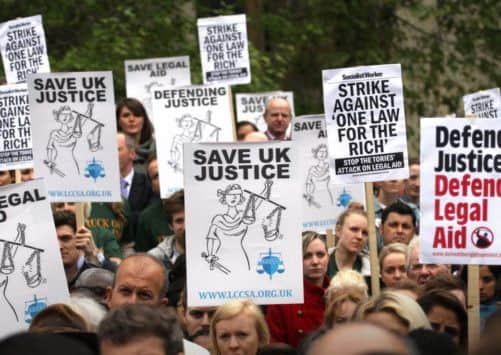Heidi Sandy: ‘I can hold my own... you don’t need to be a woman with a chip on your shoulder’


LIKE thousands of students who migrated to Leeds in the 1990s, Heidi Sandy selected her university based, largely, on the opportunities to party rather than study.
“In my first year it must have been about 80 per cent partying and 20 per cent studying,” she says. While she had thought of a career in a law, by her late teens she still wasn’t certain that she wanted to become a solicitor, so chose to read history rather than law.
Advertisement
Hide AdAdvertisement
Hide AdHowever, 16 years on any reservations she had are firmly in the past and not only is she a solicitor, but she has also just become President of the Leeds Law Society. Sandy isn’t the first woman to have held the post (though it remains relatively unusual) but, at 34, she’s certainly the youngest.


How was this achieved? Through hard work – and little else. While the profession may still be dominated by those from the upper middle-classes, Sandy was not born into a legal family.
Her dad left his secondary modern at the age of 14 and started working down a pit in north Wales, before growing a builder’s business in Wrexham.
One of five children, the then Heidi Davies went to her local comprehensive and, at weekends and school holidays worked to help fund herself through college and university.
Advertisement
Hide AdAdvertisement
Hide Ad“I’m really proud of that,” she says. “My family helped pay for me through university, but nothing has been handed to me on a plate. In law it really helps to have a support network behind you, but I haven’t really had that.
“For example, if you want to do work experience with some firms you have to know the partner somehow through friends or family or colleagues.”
Although she’s a leading commercial litigation lawyer with Gordons of Whitehall Road, in person she doesn’t come across as a potential courtroom barracuda. However, it’s also clear that she has the strength of character needed to head up an organisation like Leeds Law Society.
“I think I can hold my own,” says Sandy. “And I can give as good as I get. But I don’t really like positive discrimination. I really want women in senior positions but I want them to have earned it. If you’re strong enough you’ll get there on your own. You don’t need to be a woman who with a chip on their shoulder trying to make a point.”
Advertisement
Hide AdAdvertisement
Hide AdSandy’s no-nonsense approach could prove key as the profession attempts to navigate through one of its most difficult periods in living memory.
Ministers are proposing sweeping changes which would severely limit the amount of legal aid available to the public. That, in turn, could see small legal firms dealing with criminal cases shut up shop as they are either forced out of business or choose to shift their skills into the commercial sector.
The criminal side of the legal landscape in Leeds is small, but not insignificant, particularly given the fact that the city is one of the most important provincial centres for law in England (alongside the likes of Birmingham and Manchester) partly because Leeds firms can deliver the same high quality service as their London counterparts at a third of the price.
The proposed changes are part of an attempt by the Ministry of Justice to shave £220m off its annual budget, but the move has been widely condemned by those in the profession with a number of leading lawyers claiming the plans, which would deprive defendants of the right to choose their own lawyer and introduce price-competitive tendering for legal aid contracts, would undermine Britain’s legal system.
Advertisement
Hide AdAdvertisement
Hide AdEarlier this week, to mark the end of the consultation period on the changes, a number of lawyers took part in a protest outside the MoJ’s offices in London.
Sandy says: “With the proposed changes to legal aid, a lot of solicitors can’t sustain themselves on a resulting wage of £30,000 to £40,000 – and that’s for partners, more junior solicitors will receive less. That’s still a decent wage for most people, but when you consider the risk involved for a solicitor, the long hours, being a duty solicitor, it may not be worth it. And while the public may not feel much sympathy for the solicitors, they also have to realise that this may limit their access to justice and see them travel way beyond Leeds to get access to a criminal lawyer.
“I think even the commercial side of law in Leeds has yet to fully realise the implications too. But if more solicitors move from criminal to commercial, that’s going to mean increased competition for those working in commercial law.”
And competition is already fierce among the crowded legal scene of Leeds. Since the recession and ongoing economic down turn, a string of major construction projects have been brought to a halt and those solicitors who specialised in property and the creation of city living apartment blocks have suffered the most.
Advertisement
Hide AdAdvertisement
Hide Ad“We’ve had law firms who, 20 years ago, no one would have dreamed would go bust, disappearing,” she says. “The worst hit areas were property and corporate transaction work, because the deals weren’t being done or at least not in the capacity they were being completed at from, say, 2005 to 2007.
“It has been extremely hard for a lot of firms, but in some ways it has been a good thing because it has made a lot of them reassess themselves and forced them to look at themselves more like businesses and do things differently.”
Just a few days into her new role, there’s no doubting the fact that Sandy wants to do things very differently as head of the Leeds Law Society.
It’s a statement of intent prefaced by her years as vice-president of the organisation.
Advertisement
Hide AdAdvertisement
Hide Ad“We’ve already taken steps to modernise the society,” she says. “I’ve already helped to drive that forward and I think, over the next two years, I really want to move it into the 21st century.
“We have to be sustainable in terms of members and we need to move with the way the legal system is moving.”
That might also include the society potentially moving from its current historic home on Albion Place in the city centre into more purpose-built surroundings.
“It’s not happening yet,” she insists. “But we have premises that aren’t utilised properly and it is a place which, 30 to 40 years ago, was still surrounded by law firms. Now it’s much more of a shopping area with many law firms in more functional spaces like our offices here at Gordons, or they’re around Park Square near the courts.
Advertisement
Hide AdAdvertisement
Hide Ad“So, there is potential to move out, we own the building after all, but it would be a long term strategy developed after some considered discussion including more experienced individuals than myself.”
Such a grand gesture might be accompanied by more subtle steps too, like encouraging lawyers to tune into contemporary methods of working – less flicking through piles of files in Chesterfield armchairs, more typing into tablets in neutral, modern offices.
Sandy says: “When you see firms leading the profession, they’ve made changes and looked at themselves internally – our clients expect you to move with them. When they move forward, you can’t retain the traditional practices, it’s not acceptable.
“We had an office in Bradford which looked like a traditional practice – wood panelling and big armchairs – and here we are now in a very modern building.”
Advertisement
Hide AdAdvertisement
Hide Ad“As clients, you expect to be supported in the way that you’re working. So if you have a modern approach, then you want your solicitors to have that approach as well.
“Of course I know some people are going to say: ‘How dare she!’; But there are certain things that need to be addressed within the society.”
BATTLE OVER LEGAL AID CUTS
The proposed £220m cuts to legal aid in criminal cases comes after a £350m cut to legal aid was introduced in civil cases earlier this year.
As well as introducing price-competitive tendering and removing the right of defendants to choose their own lawyers, there is also a proposal to curb the rights of prisoners’ to claim support to pursue complaints against the prison system.
Advertisement
Hide AdAdvertisement
Hide AdThe Bar Council has written a response to the proposals which runs to 150 pages and its chairwoman Maura McGowan QC said: “There is no avoiding the simple fact that these proposals would move us from having a justice system which is admired all over the world, to a system where price trumps all.”